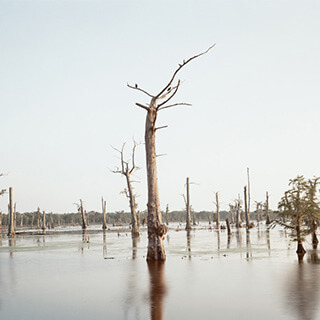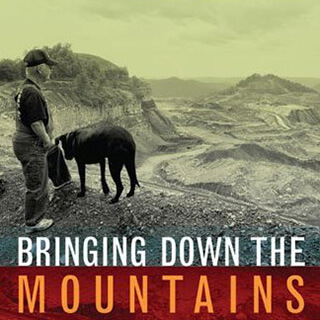Overview
A Green Democratic Revolution offers the most appropriate strategy for articulating the many democratic struggles against different forms of domination, exploitation, and discrimination with the defense of the habitability of the planet. Excerpted from Chantal Mouffe's Towards a Green Democratic Revolution: Left Populism and the Power of Affects (London: Verso, 2022) with the permission of the publisher.
Although it is only in the past fifty years that the awareness of global warming and its possible consequences for the survival of our societies has become a decisive political issue, movements to protect the living environment have existed for a long time in different forms. As André Gorz noted in Ecologica: "The ecological movement was born long before the deterioration of the environment and the quality of life posed a question of survival for humanity. It was originally born of a spontaneous protest against the destruction of everyday culture by the economic and administrative power apparatus."1André Gorz, Ecologica (Paris: Galilée, 2008), 48.

A turning point was reached fifty years ago. In 1972, the Club of Rome published the report The Limits to Growth, drawing global attention to the fact that economic growth could not continue indefinitely because of resource depletion. This was also the year in which the first Earth Summit in Stockholm brought together world leaders under the aegis of the United Nations to lay the foundation for global environmental governance. Various international gatherings stimulated research on the environment and the origin of ecological problems, a field that played an increasingly important role in the following years. Thanks to the subsequent emergence of ecologically focused "green" political parties and the rise of various ecological forms of militancy, the critique of an economic model based on limitless growth began to be recognized as a legitimate political concern. Yet at first ecological demands did not acquire a central role; they were seen as one demand among many others that a progressive politics had to consider.
Today, the situation is different. The multiplication of weather-related natural disasters has helped raise awareness of the urgent need to stabilize the climate. Moreover, it is now generally admitted that human activity is responsible for the ecological crisis. Many scientific studies have proved that global warming is the consequence of the accumulation of greenhouse gas emissions caused by the fossil fuel industries and that it is necessary to curtail them. Since 2018, thanks to youth movements such as Greta Thunberg's Fridays for Future, the question of climate change has acquired an unexpected salience among wide sections of the public. A growing part of the population is now aware that the preservation of acceptable living conditions on earth will depend on the ability to effectively combat global warming. The crucial question is no longer if we need to decarbonize our economies, but how, and how quickly.
Despite a large consensus among ecologists of all stripes on the necessity to move to renewable energy, the path to follow is far from agreed upon. Even among progressive parties no consensus exists about the strategy to follow.2For a thoughtful discussion of the different approaches, see Amanda Machin, Negotiating Climate Change: Radical Democracy and the Illusion of Consensus (London and New York: Zed Books, 2013). One of the main disagreements concerns the possibility of effectuating the ecological transition without radical systemic change.
Many ecological parties believe in the possibility of reaching a consensus on the policies that need to be implemented to decarbonize the economy. They are convinced that, since this objective is in the interest of everybody, all reasonable citizens should be able to agree on the measures needed. They warn against attempts to politicize climate issues, claiming that it might create artificial divisions and impede the wide collaboration necessary for the implementation of a sustainable model of society.
In line with this position, most ecological parties avoid taking sides in the confrontation between left and right, and declare themselves to be situated beyond such an axis. This explains why some are ready to enter in coalitions with both right and left political parties, as is the case in Germany and Austria.
From a left populist perspective, the more interesting propositions are those that, like the Green New Deal, advocate a radical ecological bifurcation which involves a rupture with financial capitalism. Such a project is often associated with the arguments used in the United States by the Sunrise Movement and Alexandra Ocasio Cortez, who, on 5 February 2019, presented a path-breaking resolution to deal with climate change to the US Congress. The resolution had the following goals: To reach net-zero greenhouse gas emissions through a fair and just transition for all communities and workers. To create millions of good, high-wage jobs and ensure prosperity and economic security for all people of the United States. To invest in the infrastructure and industry of the United States to sustainably meet the challenges of the twenty-first century. To secure clean air and water, climate and community resilience, healthy food, access to nature, and a sustainable environment for all. To promote justice and equity by stopping current, as well as preventing future and repairing historical, oppression of frontline and vulnerable communities.

The idea of a Green New Deal has actually been discussed since 2008 in various circles in the United Kingdom. A group of economists led by Ann Pettifor was scrutinizing the close links between the financial and economic sectors and the ecosystem. They claimed that in order to address the climate crisis it was necessary to have a radical intervention of the state to regulate the financial system. Furthermore, they stressed the urgency of subordinating the financial sector to the interests of society and the future of the planet. Societies, they asserted, should abandon their dependency on the economic system of globalized financial capitalism that produces ecological disasters as well as economic, political, and social inequalities.3Ann Pettifor, The Case for the Green New Deal (London: Verso, 2019).
The American version of the Green New Deal is more comprehensive because it explicitly links the reduction of greenhouse gas emissions with the objective of fixing social problems. It proposes concrete policies to bring solutions to three fundamental problems: the climate crisis, issues of poverty, and racial inequalities. In order to secure the support of the popular sectors whose jobs will be affected, it contains several important proposals which establish strong links between social, economic, and environmental policies, and prioritizes equality. One of its central ideas is to guarantee work to every unemployed American who wants to work in the construction of infrastructures that respect criteria of efficient energy.
In Britain, the Green Industrial Revolution spelled out in the Labour Party programme under Jeremy Corbyn in 2019 also asserted that social and economic justice cannot be separated from environmental justice. The election manifesto announced that Labour would create one million jobs in the UK to transform industry, energy, transportation, agriculture, and construction, while restoring the natural environment. It would promote measures for a rapid decarbonization of the economy, jointly with investment in sustainable, well-paid, and unionized jobs. It would also create new industries to revive the parts of the country that had been neglected, while working in partnership with the workforce and trade unions in every sector of the economy.
The manifesto also announced that Labour would bring energy and water under democratic public ownership and that they would be treated as rights rather than commodities. Any surplus was to be reinvested or used to reduce bills. Emphasis was put on the fact that public ownership secured democratic control over nationally strategic infrastructures and provided collective stewardship for key natural resources. These measures should bring about a radical decentralization of power in order to give local people and communities greater control over their lives and prospects.
All these different proposals call for an ecological bifurcation that articulates demands of both an ecological and social nature. Their objective is to put the ecological struggle in relation with other types of struggles to create a just and more democratic society. By establishing a political frontier and defining an adversary, they contribute to politicizing ecological issues.
The climate movement must be politicized in order to take into consideration the centrality of labour exploitation, while at the same time social struggles must recognize the urgency of global warming. As defenders of the US Green New Deal assert in A Planet to Win:
A Left populism that mobilizes a genuinely multiracial working class is an essential step in the path to creating a more equal and just society—one that can weather climate change and prevent its most catastrophic effects. That kind of politics draws a sharp line between the masses of the excluded and exploited who are likely to suffer the most, and the rich and powerful who benefit from the status quo.4Kate Aronoff, Alyssa Battistoni, Daniel Aldana Cohen, and Thea Riofrancos, A Planet to Win: Why We Need a Green New Deal (London: Verso, 2019), 183.
Although under different labels, other projects also aim at a radical ecological bifurcation. For example, L'avenir en commun of Jean-Luc Mélenchon's party La France Insoumise. In their programme for l'Union Populaire in the 2022 presidential elections examining the major challenges today, the party advocates a radical change of course and proposes a series of measures to implement an ambitious state-led ecological strategy. This includes 200 billion euros in investments for ecological and social programmes and a vast plan to adapt infrastructures to climate change. Key measures consist in enshrining the principle of the "green rule" in the constitution, whereby no more is taken from nature than can be replenished and collectivizing fundamental common goods such as water and air by democratically controlling their use and protection. Other proposals include establishing an ecological and solidarity-based protectionism to produce in France and a re-localized, diversified, and ecological agriculture that would create 300,000 jobs, fighting against precarious contracts, re-establishing a protective unemployment insurance, rolling back privatization, and introducing a tax for financial transactions. L'avenir en commun stresses the democratic character of this ecological bifurcation and declares: "We must reorganise the republican state according to ecological and democratic objectives. Ecological planning must be based on the commune, the vital level of democracy."5Jean-Luc Mélenchon, L'avenir en commun (Paris: Editions du Seuil, 2021), 45, author's translation.
At the difference of proposals, like the Green Deal of the European Union, these projects recognize that a real ecological transition cannot take place without a confrontation with financial capitalism. It demands breaking with the dominant regime of accumulation characterized by unprecedented financialization and the globalization of capital indexed to the growth of polluting industries. Although disagreements exist about the forms it should take, the struggle to end the fossil fuel industry is generally considered to be of uppermost importance. This industry is responsible for most of the greenhouse gas emissions that cause global warming and ocean acidification. Moreover, it leads to serious environmental damage to local communities.

While the fight against fossil fuels is a priority for stopping global warming, it will not be enough to achieve an ecological bifurcation capable of delivering a new model of development that guarantees democratic rights and social justice. As indicated by the Chinese government's recent announcement of a plan to reach carbon neutrality by 2060 at the latest, such an objective is perfectly compatible with an authoritarian model. And various forms of "green capitalism" might also be able to find ways to thrive without exploiting fossil fuels.
Those who promote a Green New Deal are aware of the magnitude of the problem:
For a stable climate and more equal world, we have to simultaneously unmake our fossil-fuelled lifestyles and build infrastructures that equitably distribute renewable energy. We have to dismantle the most powerful industry on earth incredibly fast, or the things that we build to replace it won't matter. This means tackling fossil capital head on.6Mélenchon, L'avenir en commun, 31.
They also state, "A radical Green New Deal leans in to the inevitable intersections of social, economic, and environmental policy, and prioritized equality."7Mélenchon, L'avenir en commun, 19.
While these proposals are vital, a project that aims to address the ecological question in its multiple dimensions cannot be limited to the struggle against capitalism, as if a bifurcation only needed to take place at the level of production. As historian Dipesh Chakrabarty argues:
While there is no denying that climate change has profoundly to do with the history of capital, a critique that is only a critique of capital is not sufficient for addressing questions relating to human history once the crisis of climate change has been acknowledged and the Anthropocene has begun to loom on the horizon of our present.8Dipesh Chakrabarty, "The Climate of History: Four Theses," Critical Inquiry 35 no. 2, (Winter 2009): 212.
The Anthropocene is a term coined in the 1980s and later popularized by the atmospheric chemist Paul J. Crutzen. In 2000, Crutzen used the term to signal the beginning of a new geological age in which humans have become the dominant force shaping the earth's climate. However, there are disagreements concerning the term's beginnings and main features. Some people prefer to speak of the "Capitalocene" to indicate the epoch's links with the development of capitalism, or the "Plantationcene" to take account of the central significance of slavery and the plantation system in the Americas in producing the current environmental crisis. This debate has given rise to extensive and diverse literature.9A good presentation of the literature can be found in Christophe Bonneuil and Jean-Baptiste Fressoz, The Shock of the Anthropocene: The Earth, History and Us (London and New York: Verso, 2016). Nonetheless, I will limit myself here to the insights in the works associated with the Anthropocene that I find important in the political domain.
Far-reaching consequences can be drawn from the recognition that we have entered a new phase of planetary history with a new climatic regime that endangers the very existence of life on earth. The Anthropocene raises a whole series of philosophical and anthropological issues about the relationship between nature and culture, humans and non-humans. To accept that we are part of nature forces us to adopt a different attitude towards the non-human and to challenge some of the basic tenets of modernity.10The best discussion of this challenge is found in Pierre Charbonnier, Affluence and Freedom: An Environmental History of Political Ideas (Cambridge: Polity, 2021).
It could indeed be pointed out that the rationalism defended by the philosophers of the Enlightenment, whose effects in the political field I discussed in chapter 2, is also responsible for the project of domination of Nature that has led to the Anthropocene. Their rationalist ambition to visualize progress as free from both affects and nature is at the origin of the modern project that sees nature as an infinite resource that could, thanks to infinite technical development, be used to carry out infinite growth.
There are those who claim that the critique of this ambition should make us reject the whole modern project. However, I believe that, just as we are able to break the link between the democratic project of the Enlightenment and its foundation in a rationalist epistemology, we should be able to rescue democratic ideals from the Promethean ambition to dominate nature and the capitalist and colonial socio-economic conditions that allowed the pursuit of this ambition. This requires conceiving democracy differently, questioning the privileged place attributed to a certain conception of freedom as emancipation from all forms of constraints, natural and social, and reclaiming the central value of equality that was eclipsed by the hegemony of liberal discourse. The democratic project must be redefined, freeing it from rationalistic biases, and it should make room for the recognition of the needs of non-humans.
In 1985, reflecting on the emergence of new forms of conflict in Hegemony and Socialist Strategy, Ernesto Laclau and I argued in favour of connecting the demands of the working class with those of the "social movements."11Ernesto Laclau and Chantal Mouffe, Hegemony and Socialist Strategy: Towards a Radical Democratic Politics
(London: Verso, 1985). Furthermore, we proposed envisaging socialism as the "radicalization of democracy"—the extension of democratic ideals to a wide range of social relations.

With the ecological crisis, the project of radicalizing democracy has acquired a new dimension. During the twentieth century, the core of the socialist project was the question of inequality and the fight for social justice, conceived in terms of an equal distribution of the fruits of growth. The struggles of the new social movements add new perspectives to the question of social justice but their focus is on autonomy and liberty, and apart from some ecological movements, they do not fundamentally target the nature of growth.
With the new climatic regime, we have entered a phase in which the struggle for social justice requires questioning the productivist and extractivist models. Growth has ceased being considered a source of protection and has become a danger for the material conditions of social reproduction. It is no longer possible to envisage radicalizing democracy without including the end of the model of growth that endangers the existence of society and whose destructive effects are particularly felt by the more vulnerable groups.
Addressing the new climatic regime requires articulating the anti-neoliberal struggle with the ecological one. The democratic project needs to be reformulated in view of the ecological exigency, and this involves struggles both at the level of production and at the level of reproduction—that is, reproduction understood in the wide sense of the totality of life on the planet, not only human reproduction. Therefore, a critique focused exclusively on capitalism is insufficient and needs to be complemented by concerns about the Anthropocene.
There is another issue I need to raise. While I find proposals for a Green New Deal essential to envisage the policies necessary to fight neoliberalism and its deleterious consequences for the climate, I do not think that those proposals have the capacity, on their own, to generate the common affects that the collective will for carrying out an ecological bifurcation requires. As we have seen, for ideas to acquire force, it is necessary that they meet affects. To awaken affects, ideas need to connect with what Cornelius Castoriadis refers to as the "imaginary significations" that institute the social world proper to a society.12Cornelius Castoriadis, World in Fragments: Writing on Politics, Society, Psychoanalysis, and Imagination (Stanford: Stanford University Press, 1997), 10–13.
In many societies, it is the affective force of the democratic imaginary that has provided the significations that motivate people to act. As recent popular mobilizations testify, democratic values, despite their relegation by neoliberalism, still play an important role in the democratic social and political imaginary. This imaginary is constituted by a repertoire of social significations that are transformed through the effects of a plurality of discursive practices. One of its nodal points is the signifier "democracy," but it is a floating signifier whose meaning is only partially fixed and varies according to different types of articulation. In the nineteenth century, under the impact of socialism, the democratic imaginary was profoundly transformed by the incorporation of social demands. And with the new climatic regime, we are now witnessing new forms of articulation of the democratic ideal. For instance, several proposals have been made to re-signify the meaning of "rights," and diverse initiatives to attribute rights to non-human entities like rivers or forests have taken places in different countries. In 2017, three countries assigned rights and legal statutes to rivers: the Atrato in Colombia, the Whanganui in New Zealand and the Ganges, and the Yamuna in India.13María Ximena González Serrano, "Blog Series 'Nature and Its Rights:' Young Researcher's Seminar April 2020," river-ercproject.eu.
To be able to bring about the necessary ecological bifurcation, the articulation of anti-neoliberal and ecological struggles needs to mobilize affects of political and ecological nature whose articulation can result in the construction of a "people." As I have repeatedly clarified, a "people" is not a sociological category but a discursive construction with a symbolic and libidinal dimension. It consists in federating a diversity of democratic demands and its construction necessitates a principle of articulation, a "hegemonic signifier" around which common affects can crystallize. Thanks to this hegemonic signifier, a chain of equivalence can be established among heterogeneous demands to make them coalesce in a "we" that will act towards a common aim, despite the differences among its components.
What is the hegemonic signifier that could activate the political and ecological affects for creating such a people? I propose envisaging the ecological bifurcation advocated by the Green New Deal in terms of a "Green Democratic Revolution" as a new front in the radicalization of democracy that redefines democratic principles and then extends them to new fields and a plurality of social relations. Understood in that way, the Green Democratic Revolution reactivates and enriches the democratic imaginary and procures the hegemonic signifier needed to create a chain of equivalence. It would play the role of a "myth" in the sense of Georges Sorel, an idea whose power to anticipate the future gives a new figure to the present. It is a narrative that conveys affects that could be more powerful and more credible than competing neoliberal discourses and provide the impulse for the creation of a social majority.
The survival of the planet and the conditions that make it habitable is an objective that concerns a great number of people as well as various movements with heterogeneous demands. Besides trade unions and groups organized around socio-economic issues, we find people involved in a variety of feminist, anti-racist, anti-colonial, and LGBTQ+ struggles. In ordinary circumstances, they generally insist on pursuing their own interests, but in view of the seriousness of the ecological crisis, they might become aware of the need to unite to face the forces responsible for the climate emergency and prevent the advent of authoritarian solutions. All their demands are democratic demands, albeit in different ways, and given their shared opposition to autocracy, they can identify with the vision offered by the Green Democratic Revolution. It is a project that could generate powerful affects across a diversity of groups and resonate with the demands of those who are calling for security and protection while also fighting for equality and against different forms of oppression.

For such an identification to take place it is not necessary that the participants share the same world view, and they can have different religious or philosophical convictions. Their concern for the environment can proceed from different sources and they can follow a diversity of approaches, but these differences should not constitute an insurmountable obstacle. Those involved do not have to agree on a fully fledged political programme. Some will define their aims in terms of "eco-socialism," others will prefer thinking in terms of a "citizen revolution."14For an eloquent defence of the eco-socialist vision, see Paul Magnette, La vie large (Paris: La Découverte, 2022). What they share is a common adversary and the will to maintain a habitable planet to secure the future of a democratic society that can give them the opportunity to pursue their specific struggles in a multiplicity of agonistic public spaces.
By advocating a Green Democratic Revolution, I have been delineating how I think the left populist strategy should currently be envisaged. I contend that such a strategy is the most appropriate for articulating the manifold democratic struggles against different forms of domination, exploitation, and discrimination with the defence of the habitability of the planet. The strength of a left populist strategy lies in acknowledging the partisan character of politics and the importance of mobilizing common affects in the construction of a "we" by drawing a political frontier.
The Green Democratic Revolution asserts that, to bring about a real ecological bifurcation, it is imperative to confront the powerful economic forces that resist it and to break with the neoliberal order. But it also accentuates the democratic character of this bifurcation and visualizes this rupture according to the strategy Erik Olin Wright defines as "eroding capitalism."15Erik Olin Wright, How to Be an Anti-capitalist in the Twenty-First Century (London and New York: Verso, 2019). The objective is not to "smash" capitalism but to displace it through the implementation of a series of what André Gorz calls "non-reformist" reforms and the development of alternative institutions such as cooperative and bottom-up civil-society-centred initiatives that promote economic activities embodying egalitarian relations.
The state needs to be a significant actor in a Green Democratic Revolution because, as many economists recognize, it will not be possible to achieve the necessary transition to renewable energies without ecological planning. It is illusory to imagine that the profound transformations the ecological bifurcation requires could be made by social movements alone. Activists and ecological groupings have an important role to play, but without winning elections and reaching state power it will not be possible to create the conditions to successfully confront the power of fossil capital. To be able to exercise influence on the decisions taken at state level, it is necessary to organize politically. All those who are involved in diverse ecological struggles should realize that they will not be able to make decisive advances if they shun electoral politics.
Envisaging the necessary ecological bifurcation as a Green Democratic Revolution could, I believe, provide the strategy that the left needs to successfully thwart the attempts to harness the sense of vulnerability produced by the social, economic, and climatic crises, and the affects it has generated, to promote authoritarian forms of security and protection. These demands can be articulated in a progressive way, and it would be a serious mistake to neglect them. At the moment, when neoliberalism is trying to recuperate these demands for authoritarian purposes, it is imperative for the left to impede such a move by articulating the idea of protection with the defence of the habitability of the planet, conceiving it in line with what Paolo Gerbaudo calls "protectivism," which he defines as follows: "Protectivism encompasses a great variety of policies, including social welfare, workers' representation, environmental protection and other social support mechanisms."16Paolo Gerbaudo, The Great Recoil: Politics after Populism and Pandemic (London: Verso, 2021), 112. A Green Democratic Revolution aims to defend society and its material conditions of existence and provide security and protection in a way that empowers people instead of making them retreat into defensive nationalism or a passive acceptance of algorithmic forms of governmentality.
Such a project could federate a wide variety of democratic demands because it addresses the challenge of the new climatic regime while providing social justice and fostering solidarity. Activating passions that are central to the democratic imaginary should motivate people to get involved in politics with the aim of establishing the conditions for a society where the democratic principles of liberty and equality are redefined and extended to new domains, including humans and non-humans. I contend that, understood in this way, the left populist strategy is more relevant than ever. 
About the Author
Chantal Mouffe is the Professor Emeritus of Political Theory at the Center for the Study of Democracy at the University of Westminster. Her books include Gramsci and Marxist Theory (London: Routledge and Kegan Paul, 1979), Hegemony and Socialist Strategy (London: Verso, 1985) with Ernesto Laclau, Dimensions of Radical Democracy (London: Verso, 1992), and For a Left Populism (London: Verso, 2018).
Cover Image Attribution:
Mural of seagulls and plastics by artist Sabotaje al Montaje at a port in Hamburg, Germany, August 8, 2021. Photograph by and courtesy of Flickr user michael_hamburg69.Recommended Resources
Text
Chakrabarty, Dipesh. "The Climate of History: Four Theses." Critical Inquiry 35, no. 2 (2009): 197–222.
Charbonnier, Pierre, Affluence and Freedom: An Environmental History of Political Ideas. New Jersey: Wiley, 2021.
Driesen, David M. Economic Thought and U.S. Climate Change Policy. Cambridge: MIT Press, 2010.
Fremstad, Anders and Paul, Mark. "Neoliberalism and Climate Change: How the Free-Market Myth has Prevented Climate Action." Ecological Economics 197 (2022): 1–10.
Gorz, André. Ecologica. London: Seagull Books, 2010.
Machin, Amanda. Negotiating Climate Change: Radical Democracy and the Illusion of Consensus. London & New York: Bloomsbury, 2013.
Web
Meyvis, Ludo, "Chantal Mouffe, Defiant Thinker: "Don't simply dismiss populism." Ku Leuven, January 31, 2019. https://nieuws.kuleuven.be/en/content/2019/patronsaintsday-chantal-mouffe.
Mouffe, Chantal, "The Affects of Democracy." Geneva Graduate Institute, February 19, 2018, YouTube video, 1:35:58. https://www.youtube.com/watch?v=VuPC10SZ8nU.
———. "Left Populism Over the Years." Open Democracy, September 10, 2018. https://www.opendemocracy.net/en/can-europe-make-it/left-populism-over-years-chantal-mouffe-in-conversation-with-rosemar/.
———. "Us and Them." New Left Review, October 12, 2022. https://newleftreview.org/sidecar/posts/us-and-them.
Spears, Ellen Griffith. "Social Justice Environmentalism." Southern Spaces, March 12, 2020. https://southernspaces.org/2020/social-justice-environmentalism/.
Similar Publications
| 1. | André Gorz, Ecologica (Paris: Galilée, 2008), 48. |
|---|---|
| 2. | For a thoughtful discussion of the different approaches, see Amanda Machin, Negotiating Climate Change: Radical Democracy and the Illusion of Consensus (London and New York: Zed Books, 2013). |
| 3. | Ann Pettifor, The Case for the Green New Deal (London: Verso, 2019). |
| 4. | Kate Aronoff, Alyssa Battistoni, Daniel Aldana Cohen, and Thea Riofrancos, A Planet to Win: Why We Need a Green New Deal (London: Verso, 2019), 183. |
| 5. | Jean-Luc Mélenchon, L'avenir en commun (Paris: Editions du Seuil, 2021), 45, author's translation. |
| 6. | Mélenchon, L'avenir en commun, 31. |
| 7. | Mélenchon, L'avenir en commun, 19. |
| 8. | Dipesh Chakrabarty, "The Climate of History: Four Theses," Critical Inquiry 35 no. 2, (Winter 2009): 212. |
| 9. | A good presentation of the literature can be found in Christophe Bonneuil and Jean-Baptiste Fressoz, The Shock of the Anthropocene: The Earth, History and Us (London and New York: Verso, 2016). |
| 10. | The best discussion of this challenge is found in Pierre Charbonnier, Affluence and Freedom: An Environmental History of Political Ideas (Cambridge: Polity, 2021). |
| 11. | Ernesto Laclau and Chantal Mouffe, Hegemony and Socialist Strategy: Towards a Radical Democratic Politics (London: Verso, 1985). |
| 12. | Cornelius Castoriadis, World in Fragments: Writing on Politics, Society, Psychoanalysis, and Imagination (Stanford: Stanford University Press, 1997), 10–13. |
| 13. | María Ximena González Serrano, "Blog Series 'Nature and Its Rights:' Young Researcher's Seminar April 2020," river-ercproject.eu. |
| 14. | For an eloquent defence of the eco-socialist vision, see Paul Magnette, La vie large (Paris: La Découverte, 2022). |
| 15. | Erik Olin Wright, How to Be an Anti-capitalist in the Twenty-First Century (London and New York: Verso, 2019). |
| 16. | Paolo Gerbaudo, The Great Recoil: Politics after Populism and Pandemic (London: Verso, 2021), 112. |







